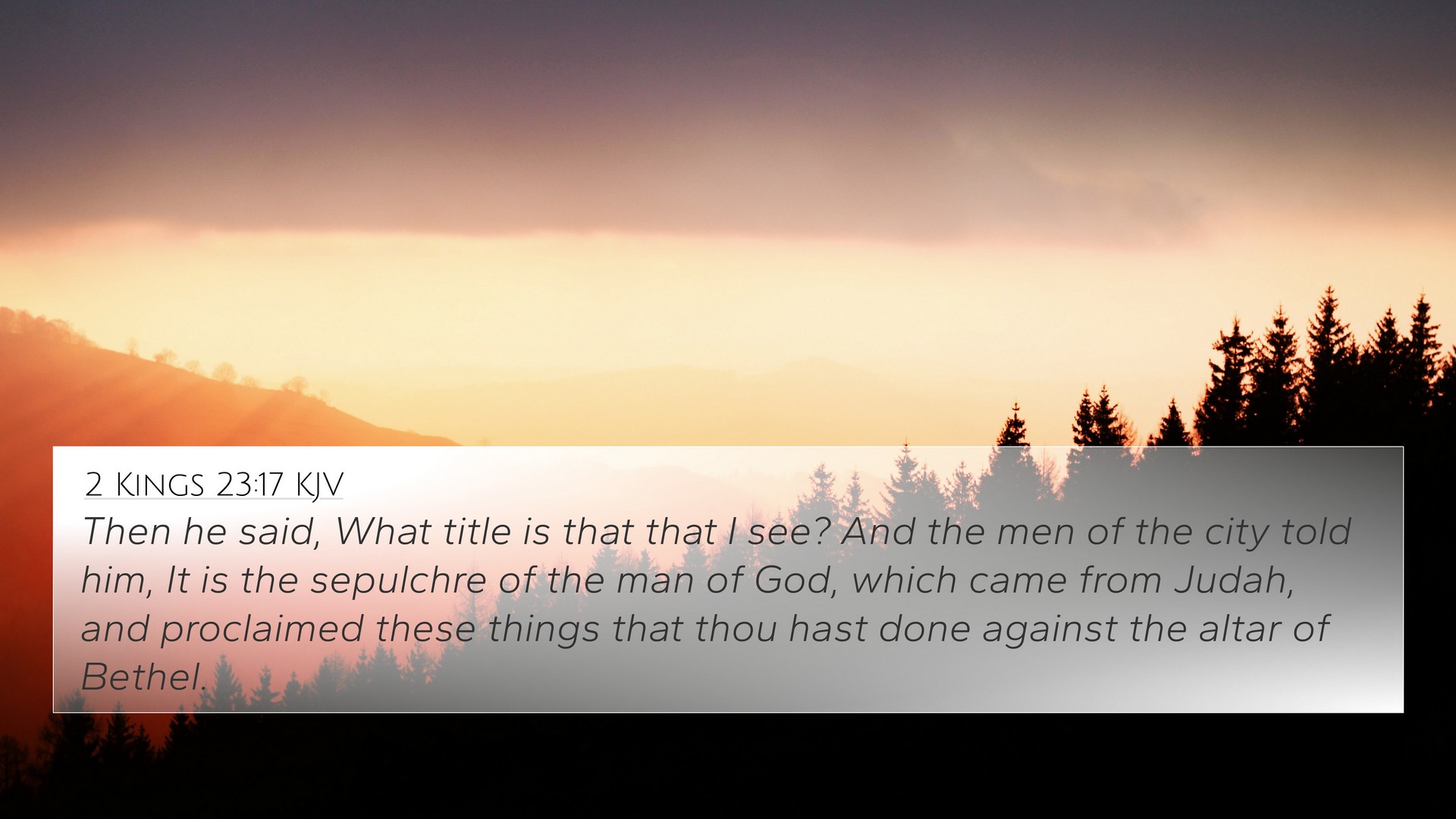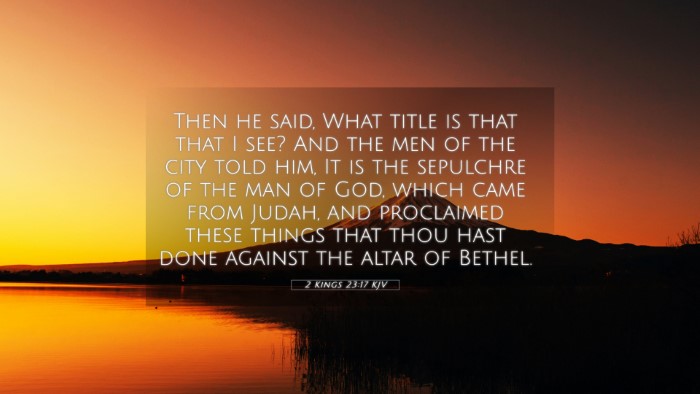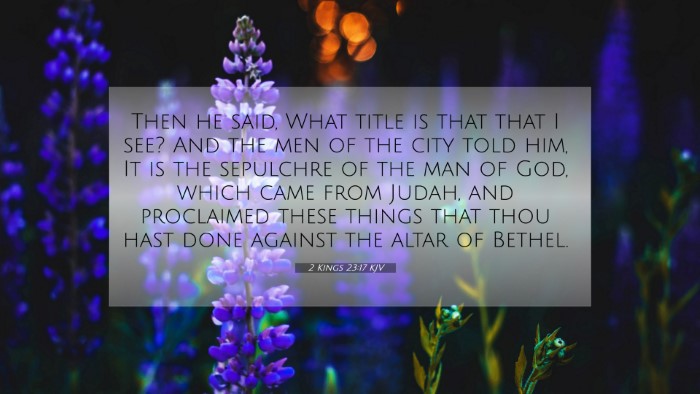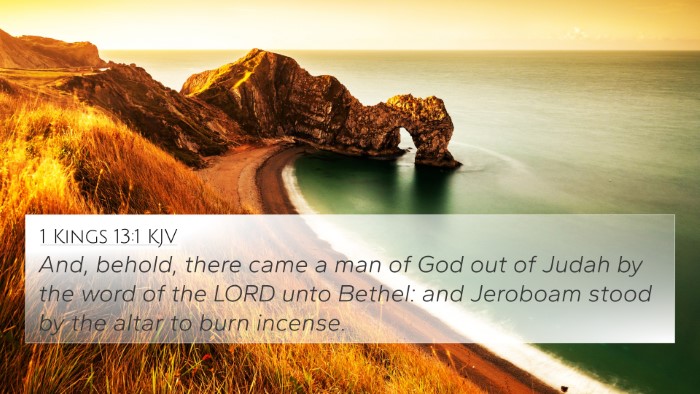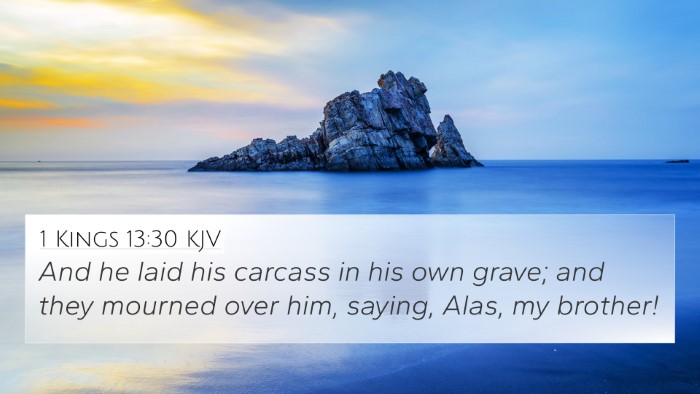Understanding 2 Kings 23:17
verse in context: 2 Kings 23:17 states, "Then he said, What is that monument that I see? And the men of the city told him, It is the sepulchre of the man of God, which came from Judah, and proclaimed these things that thou hast done against the altar of Bethel." This verse comes in the context of King Josiah's reforms as he seeks to restore true worship in Israel.
Commentary Insights
This verse highlights Josiah's discovery and recognition of the grave of an earlier prophet who prophesied against the idolatrous practices occurring in Bethel. Various commentators provide insights into this significant moment:
-
Matthew Henry: Henry emphasizes that this recognition of the prophet's grave signifies the continuation of God's plan and the importance of prophetic voices within history. The man of God from Judah symbolizes those who stand for divine truth amidst prevalent falsehoods.
-
Albert Barnes: Barnes focuses on the notion of remembrance and reverence for God's messengers. He suggests that King Josiah’s inquiry reveals a respect for the prophet’s warning against the sinful practices manifested in altars like those at Bethel. The verse illustrates how God’s word does not go unheeded even amidst rampant disobedience.
-
Adam Clarke: Clarke notes the significance of the location and the historical context. It informs us about the lasting impact a prophet's words can have. The grave of the man of God stands as a permanent testament against the idolatry Josiah sought to eradicate, highlighting a connection between God’s planned judgments and the need for reform.
Cross-References and Connections
This verse is interlinked with various other scriptures that reinforce its themes, providing a deeper spiritual understanding:
- 1 Kings 13:1-2: Relates to the prophecy made against the altar of Bethel by the unnamed prophet from Judah.
- 2 Kings 22:11-13: Discusses Josiah’s discovery of the Book of the Law and the ruling of the Lord, leading to significant reform.
- Jeremiah 1:1-3: Contextualizes the period of prophetic ministry in which Josiah was active, emphasizing the role of prophets in guiding the nation.
- Isaiah 44:25: Highlights the futility of idol worship and God's omniscience in wisdom contrasting with the foolishness of idolatry.
- Ezekiel 14:6: Calls for repentance and forsaking idols, echoing the same convictions present during Josiah's reign.
- Matthew 5:17-18: Jesus confirms the continuity of God's promises and judgments found in the Law and the Prophets, signalling the importance of these messages.
- Hebrews 1:1-2: Reflects on God speaking through various prophets and establishing a legacy through them, linking to the unique calling of the man of God in this narrative.
Thematic Connections
This verse fits into broader biblical themes such as:
- The Importance of True Worship: King Josiah exemplifies efforts to restore authentic worship, similar to themes reiterated throughout 2 Chronicles and Deuteronomy.
- Accountability of Prophets: This connects to the broader discourse of prophetic accountability and the consequences of obeying or disobeying God’s voice through them.
- The Folly of Idolatry: Juxtaposed with the call to true worship, this verse distinctly critiques the worship practices against God’s directives found elsewhere in scripture.
- Memory and Legacy: The grave serves as a symbol of both remembrance and warning against turning from God's commands, tied to the concept of covenant faithfulness.
Practical Applications and Reflections
For contemporary readers, this verse encourages:
- Reflection on Idolatry: Recognizing modern forms of idolatry and the importance of placing God at the center of one’s life.
- Respect for God’s Messengers: Acknowledging the teachings from scripture and the need to listen to God's prophets both historically and today.
- Commitment to Reform: Reflecting on personal spiritual journeys and the need for reform in alignment with biblical truth.
Conclusion
2 Kings 23:17 serves as a reminder of God’s steadfastness through His messengers and the significance of reforming worship practices to align with scriptural directives. By understanding this verse and its connections through cross-referencing and thematic analysis, believers can deepen their faith, enhance their study practices using relevant tools for Bible cross-referencing, and strengthen their relationship with God.
